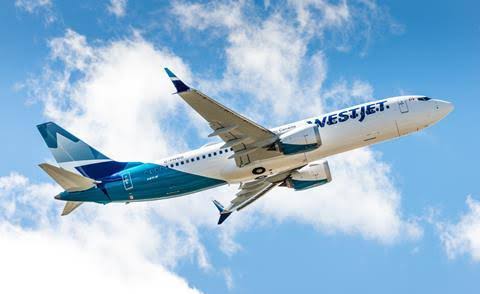
In a shocking incident that has raised concerns over airline safety and professionalism, a WestJet flight attendant has been accused of assaulting a passenger during a routine flight. The altercation, which reportedly occurred on a flight from Calgary to Toronto, has drawn widespread attention, igniting debates about in-flight conduct, airline responsibility, and passenger safety.

The Incident
The alleged incident took place during a scheduled WestJet flight on a busy route connecting Calgary International Airport with Toronto Pearson International Airport. Passengers on the flight described the atmosphere as calm and routine until a sudden commotion erupted midway through the flight. According to eyewitness accounts, a disagreement between a male passenger and a flight attendant escalated into a physical altercation, leaving passengers in shock.
The male passenger, whose identity has not yet been publicly revealed, reportedly became frustrated after his requests for assistance were ignored or dismissed by the flight attendant. Multiple witnesses have stated that the passenger had politely requested assistance several times, but tensions rose after he was allegedly spoken to in a condescending manner. One passenger, sitting near the scene of the incident, recalled: “It was a simple request. He just wanted some help, and things spiraled out of control so quickly. It was terrifying to witness.”
It remains unclear what exactly triggered the physical altercation, but several passengers have claimed that the flight attendant became visibly agitated. The situation allegedly escalated when the flight attendant struck the passenger after a verbal argument, shocking many on board.
Passenger Reactions
The incident created an atmosphere of panic inside the aircraft. Several passengers described the situation as chaotic, with some worried that the altercation might endanger the safety of the flight. “Everyone around us was shocked. Nobody expected a flight attendant to act like that,” said another passenger. “People were crying, and some tried to move away from the aisle where the altercation took place.”
A few passengers attempted to intervene, separating the flight attendant from the passenger. One eyewitness recalled how two other crew members quickly arrived at the scene and took control of the situation, leading the flight attendant away from the area and instructing the passenger to remain seated.
The aircraft’s captain soon made an announcement, informing passengers that the situation was under control and asking them to remain calm for the remainder of the flight. The plane continued its journey, and the passenger involved in the altercation was reportedly checked for any injuries by a fellow passenger who was a medical professional.
WestJet’s Response
Upon landing in Toronto, local authorities were informed, and both the flight attendant and the passenger were questioned by law enforcement. WestJet has issued an official statement addressing the incident, stating that the airline takes these accusations very seriously and has launched an internal investigation to determine the details surrounding the altercation. “WestJet is committed to providing a safe and comfortable experience for all of its passengers,” the statement reads. “We do not tolerate any form of physical altercation or misconduct by our staff or passengers, and we are cooperating fully with authorities to investigate this matter.”
The flight attendant in question has been suspended pending the outcome of the investigation. WestJet emphasized that while their employees are trained to handle difficult situations with professionalism, this incident does not reflect the values of the airline. The company also issued an apology to the passengers on board for the disruption and distress caused by the altercation.
Legal Ramifications
The legal consequences of the incident remain unclear as the investigation is still ongoing. Authorities in Toronto have confirmed that both the passenger and the flight attendant were interviewed after the flight landed, and no formal charges have been filed as of yet. However, legal experts suggest that if the flight attendant is found guilty of assault, it could lead to serious consequences for both the individual involved and the airline.
Under Canadian law, assault charges carry significant penalties, especially when occurring in a confined environment like an airplane, where the safety of all passengers is paramount. The law also holds airlines accountable for ensuring that passengers are not placed in harm’s way due to the actions of staff members. If WestJet is found negligent in its training or oversight of staff behavior, it could face lawsuits from the affected passenger as well as other passengers who were traumatized by the event.
Broader Implications for the Airline Industry
This incident has sparked a wider conversation about the responsibilities of airline staff and the expectations of passengers in high-stress environments. Airlines are known to provide rigorous training for their cabin crew, focusing on de-escalation techniques, customer service, and emergency protocols. However, some industry experts have raised concerns about whether the increasing pressure on airline staff—especially during the post-pandemic travel boom—could be contributing to more in-flight incidents.
In recent years, the airline industry has seen a rise in confrontations between passengers and staff, exacerbated by flight delays, cancellations, and pandemic-related tensions. Many crew members have reported feeling overwhelmed, with flight schedules stretched to the maximum to accommodate a surge in demand. A spokesperson for a Canadian airline workers’ union, while not commenting directly on the WestJet incident, suggested that airlines need to revisit their training protocols and ensure adequate support for crew members who face constant high-pressure situations.
“Airline staff are trained to deal with challenging customers and high-stress environments, but they are human too. Burnout and stress can sometimes lead to these unfortunate incidents,” the spokesperson said. “This case is a reminder that airlines must invest in their employees’ well-being just as much as they focus on passenger safety.”
Passenger Rights and Airline Accountability
The incident raises important questions about passenger rights and the accountability of airlines in ensuring that crew members adhere to strict professional standards. Passengers have the right to expect a safe and respectful journey, and airlines are obligated to maintain this standard, both in terms of service quality and safety.
WestJet, in particular, has faced increased scrutiny in recent months for a series of operational issues, including flight cancellations, delayed responses to passenger complaints, and staffing challenges. The airline’s handling of this incident will likely influence public perception of its commitment to customer service and safety.
For passengers, the key takeaway is understanding their rights in situations like this. In Canada, the Air Passenger Protection Regulations outline compensation rules for flight delays, cancellations, and other service disruptions, but incidents involving staff misconduct open the door to more complex legal disputes.
Moving Forward
As the investigation continues, both WestJet and the broader airline industry will need to address the root causes of incidents like these. While this may be an isolated case, it underscores the importance of proper training, conflict resolution, and stress management for airline staff. Airlines must ensure that crew members are prepared to handle difficult situations without resorting to violence or behavior that endangers the safety and well-being of passengers.
For now, passengers and industry insiders alike will be watching closely to see how WestJet manages the fallout from this incident. As the legal process unfolds, it will likely serve as a case study in how airlines handle misconduct on the part of their employees—and what steps they can take to prevent future occurrences.